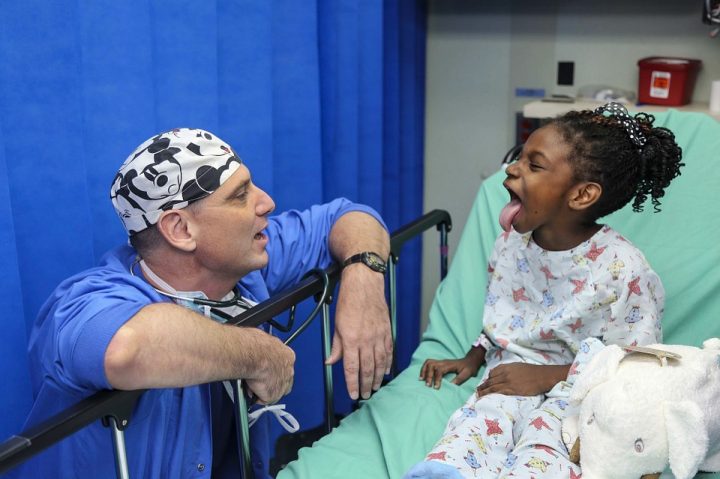High temperatures, sore throats and infections during childhood can increase the risk of also suffering from a mental disorder as a child or adolescent. This is shown by the first study of its kind to follow all children born in Denmark between 1 January 1995 and 30 June 2012. The researchers have looked at all infections that have been treated from birth and also at the subsequent risk of childhood and adolescent psychiatric disorders.
“Hospital admissions with infections are particularly associated with an increased risk of mental disorders, but so too are less severe infections that are treated with medicine from the patient’s own general practitioner,” says Ole Köhler-Forsberg from Aarhus University and Aarhus University Hospital’s Psychoses Research Unit. He is one of the researchers behind the study.

Doctor and patient. Image credit: skeeze via Pixabay, CC0 Public Domain
The study showed that children who had been hospitalised with an infection had an 84 per cent increased risk of suffering a mental disorder and a 42 per cent increased risk of being prescribed medicine to treat mental disorders. Furthermore, the risk for a range of specific mental disorders was also higher, including psychotic disorders, OCD, tics, personality disorders, autism and ADHD.
“This knowledge increases our understanding of the fact that there is a close connection between body and brain and that the immune system can play a role in the development of mental disorders. Once again research indicates that physical and mental health are closely connected,” says Ole Köhler-Forsberg.
Highest risk following an infection
The study has just been published in JAMA Psychiatry and is a part of the national iPSYCH psychiatry project.
“We also found that the risk of mental disorders is highest right after the infection, which supports the infection to some extent playing a role in the development of the mental disorder,” says Ole Köhler-Forsberg.
It therefore appears that infections and the inflammatory reaction that follows afterwards can affect the brain and be part of the process of developing severe mental disorders. This can, however, also be explained by other causes, such as some people having a genetically higher risk of suffering more infections and mental disorders.
The new knowledge could have importance for further studies of the immune system and the importance of infections for the development of a wide range of childhood and adolescent mental disorders for which the researchers have shown a correlation. This is the assessment of senior researcher on the study, Research Director Michael Eriksen Benrós from the Psychiatric Centre Copenhagen at Copenhagen University Hospital.
“The temporal correlations between the infection and the mental diagnoses were particularly notable, as we observed that the risk of a newly occurring mental disorder was increased by 5.66 times in the first three months after contact with a hospital due to an infection and were also increased more than twofold within the first year,” he explains.
Michael Eriksen Benrós stresses that the study can in the long term lead to increased focus on the immune system and how infections play a role in childhood and adolescent mental disorders.
“It can have a consequence for treatment and the new knowledge can be used in making the diagnosis when new psychiatric symptoms occur in a young person. But first and foremost it corroborates our increasing understanding of how closely the body and brain are connected,” he says.
Source: Aarhus University
